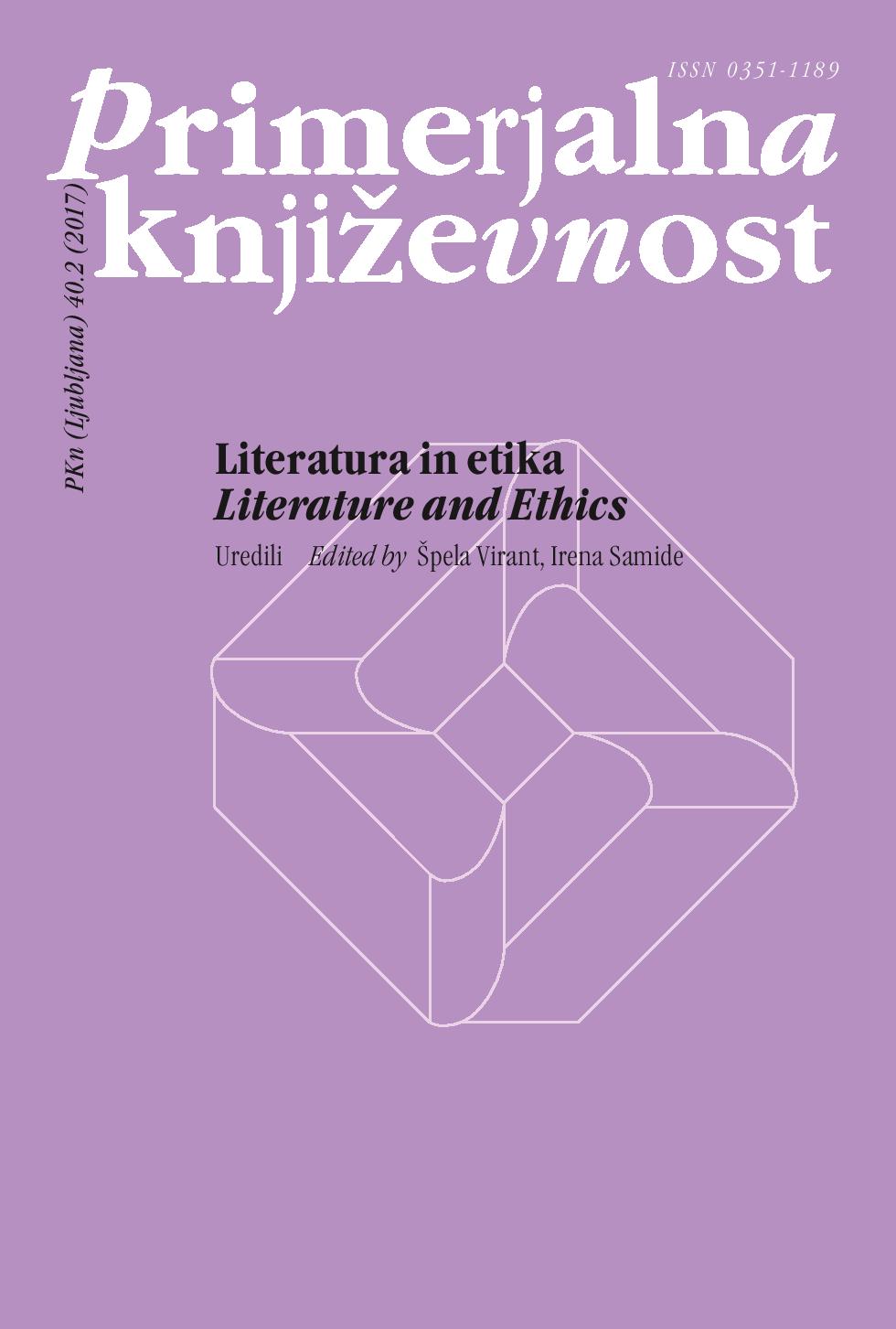Freedom and the Unconscious: Some Observations on the Ethics of Poiesis
Keywords:
literature and ethics, poetry, poetic language, poiesis, techne, the unconscious, freedom, Ereignis, extimityAbstract
The ethics of literature is defined by the imperative not to give up the workings of the unconsciousness. Literature is poiesis, creating, becoming, an event of being (Seyn). “The art belongs into the event of being” (Ereignis). On that background it is possible to figure out the incredible importance of the famous saying by Samuel Beckett from Worstward Ho: “Try Again. Fail again. Fail better” (81). And with the famous end words of the novel Unnamable: “I don’t know, I’ll never know: in the silence you don’t know. You must go on. I can’t go on. I’ll go on” (116). Beckett wrestles with the silence, he circles around the silence, which is impossible to catch by words. “The silence is the Real, so far it resists to be symbolized by language, though it is the very it that frames the symbolic before and after” (Chattopadhyaya 51). Lacan coined the neologistic term “extimacy” to address that inner nature of the Real. The extimacy offers the answer to the hermeneutic question of ethics in literature, of an event (Ereignis) of literature as the generosity (Urbančič, O krizi 11) of being (Seyn), to the question of the unconscious workings of literature not in its aesthetics or morality (neither in its religiosity or the religious jump as Kierkegaard would suggest it), but in its extimity, the silence/abyss of being (Seyn). In a short expose I analyze the poem “Zaupanje” (“Trust”) by Muanis Sinanović from his last poetry collection Dvovid (Dual Seeing) in the light of the philosophical premises, schematized in the article, and show how the poet the above sketched event does not work out in the view from the outside but from the within as an event in progress, which actualizes the reader herself.References
Areopagit, Dionizij. Zbrani spisi. Ljubljana: Slovenska matica, 2008.
Avrelij, Mark. Dnevnik cesarja Marka Avrelija. Prev. Anton Sovre. Ljubljana: Slovenska matica, 1988.
Beckett, Samuel. Neimenljivi. Prev. Aleš Berger. Ljubljana: Cankarjeva založba, 2005. (Izbrana dela, 6 zv.)
– – –. Worstward Ho (Nad najhujše). Prev. Andrej Skubic. V rokopisu. Prebrano 12. 2. 2017.
Benjamin, Walter. »Umetnina v času, ko jo je mogoče tehnično reproducirati«. Izbrani spisi. Ljubljana: SH – Zavod za založniško dejavnost, 1998. 145–175.
Césaire, Aimé. »Poetry and Knowledge«. Lyric and Dramatic Poetry 1942–1982. Charlottesville: The University of Virginia Press, 1990. Splet. 12. 11. 2016. w.scribd.com/document/169520222/Cesaire-Poetry-Knowledge. liii–lvi.
Chattopadhyaya, Arka. »Do vrat, ki se odpirajo v mojo zgodbo. Beckett in naravni detritus«. Problemi 53.9–10 (2015): 39–62.
Detela, Jure. Orfični dokumenti: teksti in fragmenti iz zapuščine. Koper: Hyperion, 2011.
Fisher, Mark. Democracy Is Joy. Splet. 13. 7. 2015. http://k-punk.org/democracy-isjoy/.
Freud, Sigmund. »Neue Folge der Vorlesungen zur Einführung in die Psychoanalyse«. Essays III (Auswahl). Ur. Dietrich Simon. Berlin: Verlag Volk und Welt, 1988. 238–295.
Günther, Gotthard. »Martin Heidegger i svjetska povjest ništavila«. Tvrđa 16.1–2 (2016): 24–44.
Heidegger, Martin. Vom Ursprung des Kunstwerks. Stuttgart: Reclam, 1992.
Herbert, Zbigniew. Beli raj vseh možnosti. Ljubljana: Društvo slovenskih pisateljev, 1992.
Hlebnikov, Velimir. »Naša osnova (tonska lestvica bodočnika)«. Apokalipsa 23.198–199 (2016): 42–57.
Kierkegaard, Søren. Strah in trepet. Ljubljana: Društvo Apokalipsa, 2005.
– – –. Etično-religiozni razpravici. Ljubljana: Kud Apokalipsa, 2009.
Lacan, Jacques. Etika psihoanalize. Ljubljana: Delavska enotnost, 1988.
– – –. »Televizija«. Problemi. Eseji 31.3 (1993): 45–88.
– – –. Spisi. Ljubljana: Analecta, Društvo za teoretično psihoanalizo, 1994.
Malik, Om. »Silicon Valley Has an Empathy Vacuum«. The New Yorker. Splet. 28. 11. 2016. http://www.newyorker.com/business/currency/silicon-valley-has-anempathy-vacuum.
Miller, Jacques-Alain. »Elementi epistemologije«. Gospostvo, vzgoja, analiza: zbornik tekstov Lacanove šole psihoanalize. Ur. Slavoj Žižek. Ljubljana: Univerzum, 1983. 1–13.
Osojnik, Iztok. »O etiki kot blagovnem fetišu«. Totalitarizem potrošništva. Ur. Primož Repar. Ljubljana: Društvo Apokalipsa, 2015. 123–135.
– – –. »Neoliberalna paradigma v luči eksperimentalne poezije«. Symposia. Štiri razprave o slovenski poeziji in ena o Dušanu Pirjevcu. Ljubljana: KUD Police Dubove, 2015. 107–160.
Paić, Žarko. Sloboda bez moći. Politika u mreži entropije. Zagreb: Udruga Bijeli val, 2014.
– – –. »Kierkegaard in moč tehnosfere: Kdo je subjekt ‘filozofske vere’?« Totalitarizem potrošništva. Ur. Primož Repar. Ljubljana: Društvo Apokalipsa, 2015. 148–183.
– – –. (ur.). »Tehnosfera: Kibernetika, filozofija informacije, tehnoznanosti«. Tvrđa 16.1–2 (2016): 16–186.
Pareyson, Luigi. Ontologija slobode. Zagreb: Demetra, 2005.
Plato. »Simposion ali o Erosu«. Simposion in Gorgias. Prev. Anton Sovre. Ljubljana: Slovenska matica, 1960. 5–134.
Rimbaud, Arthur. Lettre du Voyant. Splet. 2. 2. 2017. http://bacdefrancais.net/lettre-du-voyant-rimbaud.php.
Sinanović, Muanis. Dvovid. Maribor: Litera. 2016.
Stiegler, Bernard. »Teatar individuacije: pomak u fazi i rješenost kot Simondona i Heideggera«. Tvrđa 16.1–2 (2016): 63–74.
Urbančič, Ivo. »Kritični obrat modernosti«. Friedrich Nietzsche. Onstran dobrega in zlega. H genealogiji morale. Ljubljana: Slovenska matica, 1988. 347–401.
– – –. O krizi: epilog k zgodovini nihilizma. Ljubljana: Slovenska matica, 2012.
Weil, Simone. Trepet in poslušnost. Ljubljana: Društvo izdajateljev časnika 2000, 1985.
Wittgenstein, Ludwig. Tractatus Logico-Philosophicus. Splet. 8. 2. 2017. https://www.gutenberg.org/files/5740/5740-pdf.pdf/.
Wordsworth, William. Pesmi. Ljubljana: Mladinska knjiga, 2004.
– – –. Heart Leap Well. Splet 17. 1. 2012. http:/www.poemhunter.com/poem/hart-leap-well/.


